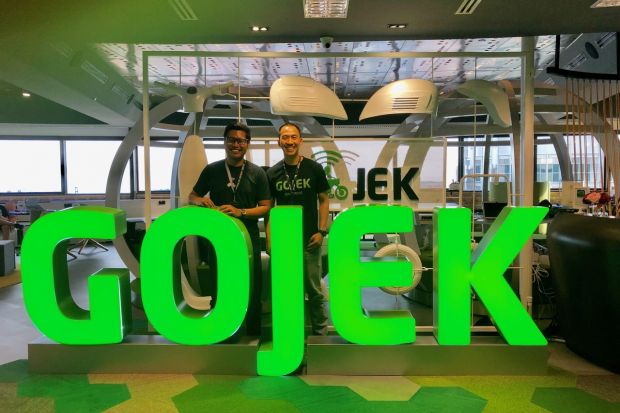GoJek, on tackling the Singapore market
“Honestly, to me, it’s still a miracle that we have an office here with that view. From that two-storey house in Jakarta, I never thought we’d get here,” says Raditya Wibowo.
Mr Wibowo is the global head of transport at GoJek. As one of the early employees of the firm, he has seen the company grow from a ride-hailing startup operating out of a two-storey house in Jakarta with a limited number of functioning toilets to its current status as Indonesia’s first decacorn.
The plan to take on the Singapore market, code-named “Project Simba”, came on the back of plans to take on the “trifecta” – Philippines, Vietnam, and Thailand or Fortune, Vogue, and Tatler respectively.
Today, GoJek is in Indonesia, Singapore, Thailand and Vietnam, with an engineering office in Bengalore, India.
“If you look at all the Southeast-Asian markets, Vietnam is probably the most similar to Indonesia. They’ve had bike taxis forever. Thailand has bike taxis too, but it’s different because they have had a good public transport system for longer. Singapore is obviously very different from either of them,” said Mr Wibowo.
Speeding over road bumps
The company has leveraged the differences to its advantage. Singapore is, for instance, GoJek’s first market that supports credit cards. They also test a lot of features for “four-wheelers” in Singapore that may subsequently be deployed in Indonesia.
Not that it was all smooth-sailing from the get-go.
Like the fact that a lot of location searches in Singapore are done via zip code.
“Every building (in Singapore) has a zip code! That’s a local nuance that I found very interesting. In Singapore a lot of searching is done by postal codes. That is just not something you do in Indonesia or anywhere else,” says Mr Wibowo.
Or how vocal users would be.
“In Indonesia, … because GoJek has been there for awhile right, and there are some quirks in the product that people have gotten used to and adapted to. So it isn’t the best way to work but it’s always worked like this and we’re used to it so okay lah. But here, we came on a blank slate and people really gave us very honest feedback on what they thought was wrong with our product. And initially, it a bit surprising for us. But, I was actually very happy that happened because it really helped us push ourselves to make it better,” says Mr Wibowo.
Banking on Talent
The launch of GoJek’s ride-hailing app in Singapore in late 2018 was, arguably, one of the highlights of the year for commuters and drivers alike. But the firm actually set up its offices in Singapore as early as two years before it launched its app here.
“In term of what Singapore does, it’s really around a talent play (and) the fact that Singapore is really well-connected and physically easy to fly in and out of,” says Singapore general manager Lien Choong Luen. Under Mr Lien’s leadership, the initial team, which comprised data scientists, has grown into a full-fledge operations team for the local market and a team that takes care of corporate functions, especially for markets outside of Indonesia.
Ultimately, the company is growing and evolving. As Mr Lien puts it, there’s a need for a “GoJek DNA” and a need for a “local DNA”. ANd while each local office has some semblance of the GoJek DNA, GoJek is itself evolving.
Earlier this year, GoJek unveiled a new visual identity as part of its evolution from “a Jakarta-based ride-hailing service to Southeast Asia’s leading Super App”. It also announced that it is working out how to offer food delivery service in Singapore and that it could expand to Malaysia.
But some things remain, even if the delivery method is different.
“What is social impact in Indonesia is very different from social impact in Singapore. So what we were trying to do for drivers in Indonesia was some credit system, pay later. in Singapore the drivers were very concerned around operating expenses so we have a lot of benefits for them to go better, help them reduce their operating expenses,” said Mr Lien.
“There’s no honeymoon period. And we should not expect a honeymoon period, that anyone cuts us any slack because we came from Indonesia or we have a slightly different context. It is our job, everyday, to ensure we deliver for the consumer, for the driver something that is good, something that is workable.”


 Thailand
Thailand




